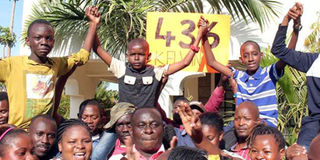Kakamega produces best candidate as grades drop compared to last year

From left, some of the top scorers from Tender Care Junior Academy: Linus Mwai (429), Kevin Ngatia (436), and Kelvin Mutua (432) celebrate their results on December 1, 2016 at the institution. PHOTO | DENNIS ONSONGO | NATION MEDIA GROUP
What you need to know:
- Unlike the previous year, the number of candidates with 400 and plus marks dropped from 7,560 to 5,143, representing a 31 per cent decline.
- Education Cabinet Secretary Fred Matiang’i, releasing the results, described them as a true reflection of the candidates’ abilities.
Master Victor Oduor Odhiambo of Daisy Special School in Kakamega topped this year’s Kenya Certificate of Primary Education (KCPE) examinations, whose results were released Thursday by Education Cabinet Secretary Fred Matiang’i.
He obtained 437 marks out of 500.
The victorious Victor was followed by Kevin Ngata of Tender Academy in Nairobi with 436 marks and Caroline Gatwiri Gitonga of Fred’s Academy in Meru and Titus Abongo Anyona of Marrell Academy in Bungoma, both of whom had 434 marks.
Some other top performers were Linda Noel Adongo of Xaverian Primary School, Kisumu, Malaika Wambui Agunda of Riara Springs Academy, Michael Okinyi Odhiambo of Rongo Success Academy in Migori, Janerosa Wanjiku Mwangi of St Mary’s Girls Boarding School in Nakuru, all of whom obtained 433 marks.
Also emerging among the top ranks were Faith Swanya of St Peter’s Elite in Nakuru, who scored 432 marks, Aengwo Kiplagat of Kings Hill Academy and Juliet Musimbi of Hill School in Uasin Gishu, 421 and Florence Akoth Ondiek of Tender Care, Anita Terry of Cape View Academy in Homabay and John Mutua Muendo of ACK Boarding Primary in Makueni, all with 430 marks.
Even so, Victor’s marks were 10 percentage points below last year’s top performer, Aggrey Akhanyinya Wabuko of St Joseph’s Academy, also of Kakamega County, who got 449 marks, the best in eight years.
If Victor was ranked against last year’s candidates, he would have not featured in the top 50.
This is the first time in four years that a top candidate had such a grade. In 2014, the lead candidate had 441 and in 2013, it was 444.
Overall, there was a marked drop in performance this year, a fact largely attributed to the strict measures deployed this year to eliminate cheating.
Unlike the previous year, the number of candidates with 400 and plus marks dropped from 7,560 to 5,143, representing a 31 per cent decline.
STRICT MEASURES
Similarly, the number of candidates who scored less than 400 marks more than doubled – from 3,061 in 2015 to 6,747.
Education Cabinet Secretary Fred Matiang’i, releasing the results, described them as a true reflection of the candidates’ abilities.
“The grades have dropped compared to the past, but they honestly reflect what the candidates scored,” he said at the Kenya Institute of Curriculum Development (KICD).
A total of 942,021 candidates comprising 49.7 per cent girls and 50.3 per cents wrote the exams a month ago.
Girls did better than boys in English, Kiswahili and Kenyan sign language, while boys excelled in mathematics, science, social studies and religion.
Uncharacteristically, the minister was accompanied by two other Cabinet Secretaries, Gen Joseph Nkaissery (Interior) and Mr Joe Mucheru (Information and Communication Technology), whose ministries were involved in exam administration.
No results were cancelled although there were some 21 cases of attempted cheating, which, the minister said, were detected and stopped.
Last year, results of some 2,709 candidates were cancelled due to irregularities, eliciting public uproar over the administration of national tests.
“For the first time in many years, the national examinations were not leaked. The administration of the examinations was the smoothest in recent memory,” said Dr Matiang’i.
This was a consequence of systemic and operational reforms undertaken at the Kenya National Examinations Council (Knec) during the year, starting with the dissolution of the previous board and sacking of top officials, including then chief executive Joseph Kivilu and appointment of a new team, headed by Prof George Magoha, previously the vice chancellor of the University of Nairobi.
Some of the measures introduced to safeguard the exams included restructuring the school term and shortening the third term to allow special focus on the tests.
NO RANKING
However, Dr Matiang’i highlighted some of the unethical practices that persisted in exams, chief among them private schools operating multiple examinations centres, which were used to register weak candidates and cheat the system.
The proprietors of those schools registered a few bright candidates in one centre and drilled them to excel and earn a high mean score, which was used as a marketing bait to get more children.
But the minister put such schools on notice, directing Knec to deregister such centres forthwith.
“I wish to announce that the ministry has resolved to stamp out such unethical practice once and for all,” he said.
“For a start, Knec will not register these schools as centres for national examinations starting 2017.”
He also outlawed the practice of having private candidates sit exams in private centres, some behind shops, describing as dens of exam cheating.
The chairman of the Kenya National Examinations Council, Prof George Magoha, described the results as well earned and chastised teachers, parents and crooks who had thrived on stealing exams, saying they had undermined the credibility of the tests.
Knec did not rank schools or candidates as earlier expected given that Parliament had passed a law that compelled it to do so. Dr Matiang’i explained that the legislation had come late, just in October, and the ministry had not had time to develop the guidelines to give force to the law.
The release of this year’s exam was markedly different.
This was the first time in history of KCPE, introduced in 1985, that the results were released in early December.




